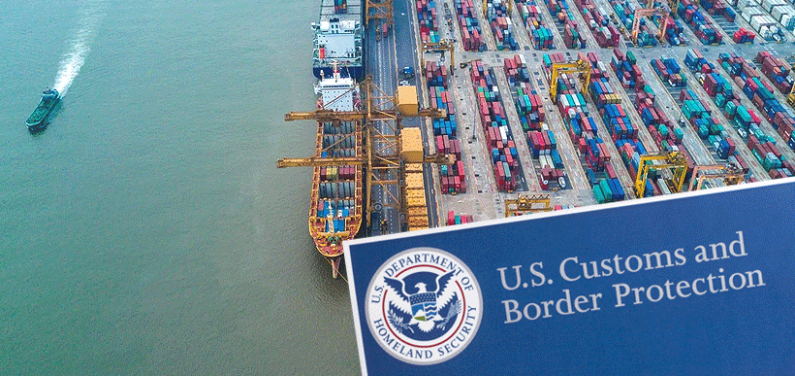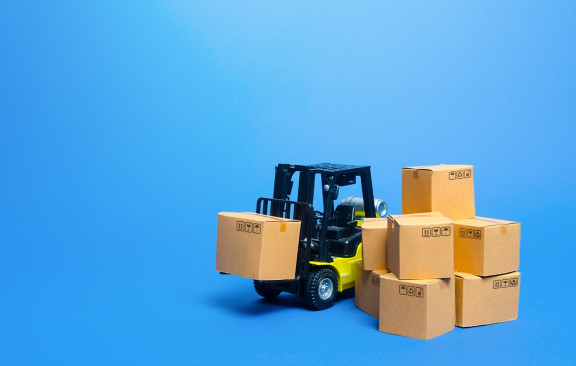5 tips for importing goods to the US for beginners
1. Research the laws, trade barriers and tariffs
Basically, you want to make sure what you’re doing is legal before you try and do it and, potentially, run into trouble. The US might be known as a trade-friendly nation, but it still has strict laws and procedures that you must follow.
It's up to you to become familiar with the legislation relevant to your business and products, including relevant trade barriers and tariffs, as well as understanding the associated business formation costs. Trade barriers can include things like licenses and quotas for specific products to protect local companies and economies. Tariffs are a tax on exported or imported products, designed to safeguard the domestic industry.
If you want extra guidance with this - because it can be tricky! - you can contact the Office of International Trade. It sounds big and scary, but it’s set up to help small businesses compete in the global marketplace. If you’re wanting to import food or agricultural products, you’ll want to check with the Food and Safety Inspection Service, too.
Also keep in mind that when importing goods into the United States, strict adherence to consumer protection laws is essential to ensure compliance with regulatory standards and safeguard consumer interests. Failure to follow these laws can lead to customs issues, fines, and reputational damage, underscoring the importance of thorough legal compliance for successful import operations.
2. Make real connections in the export country
As a small-scale importer, you’ll likely be relying somewhat on the experience of your chosen manufacturer, supplier or distributor in the export country, usually China. It’s important to build relationships with these people to ensure that they can be trusted and are meeting the standard of service required of them. It’s a good idea to arrange an in-person meeting to make sure everything is in order. It can help to give you peace of mind and it’s also good practice to make a personal connection with your business partners.
3. Consider consulting an expert
Importing bulk goods to the US is a lot more serious than running a dropshipping business or a simple eCommerce store. You should consider hiring an expert to guide you through the process, rather than solely relying on Youtube tutorials or blog articles like this one. Navigating the laws and import and export regulations of importing to the US can be a really challenging process. It can be a good idea to hire a Customs Broker to help make the process go as smoothly as possible.
4. Get the required licenses, bonds and permits
Depending on what you’re importing to the US, you may be required to obtain a specific license or permit. You can see the list of products that require a license or permit here.
Additionally, you will have to obtain a customs bond, which can be either single-entry or continuous. If you are planning to import goods to the US regularly, then a continuous customs bond is the better option. If you’re just doing one large shipment or you’re unsure of how often you’ll be importing, you can start with a single-entry bond and see how you go.
Again, you might want to consider tip #3 above when dealing with licenses, bonds and permits for importing to the US. The paperwork can be tricky and tiresome. Expert help might be beneficial for the first time around.
5. Educate yourself
Running a business - especially one that involves importing goods to the US - requires ongoing education and training. You can learn by doing, but if you want to avoid beginner mistakes you can take short online courses or read widely to ensure you have a good understanding of how to import goods to the US.
You can find online courses about importing on:
The US Customs Procedure: Step by Step

1. Get compliant (Hire a Customs Broker)
Compliance is crucial when it comes to importing goods to the US. If you don’t get everything in order prior to your shipment arriving on US soil, you could face major fines that could cripple your business before it’s even started. That’s why it’s recommended that you hire a Customs Broker to ensure you’re compliant. It might cost a bit of money up front, but it can save you headaches and money long-term. An experienced Customs Broker can provide valuable advice, handle your paperwork, and ensure you’re compliant so that everything’s smooth sailing once your goods arrive in the US.
2. Obtain required permits and licenses
Your Customs Broker can also advise you as to which permits and licenses you need, if any. You should wait until your applications have been accepted before placing an import order.
Products that require a special license include food products, animal products, plants, prescription medication, trademarked items (branded goods), and copyrighted items (music, films etc). Visit this website to see if you require a permit or license for importing to the US.
3. Avoid a $5000 fine (Import Security filing)
Want to avoid paying $5000 to the US government? Then make sure you file the Import Security Filing, commonly known as “10+2”. It’s a requirement for goods arriving in the US by ship. If your goods are arriving by air, you don’t have to worry about this. Failure to comply with the rule could ultimately result in fines of up to $5000, increased inspections and delay of cargo. Again, this is something a Customs Broker could handle for you, but if you’re handling everything yourself, you need to be aware of this.
4. Getting your product through US Customs
Once you’ve got all the paperwork sorted, you should contact the service port of entry near you, or the one your goods will be arriving at. You can ask to speak with a Customs and Border Protection (CBP) officer who specializes in the product you’re importing. They can provide you with specific product requirements and advise you of any extra things you need to do before your shipment sets sail.
Once you have the “OK” from the CBP officer and you’re confident that you’ve filed all the necessary paperwork, you can proceed with importing your goods.
5. Submit documents on arrival
Once your goods arrive at your port of entry in the US, you or your Customs Broker have to file another bunch of documents within five days. These documents include:
- Bill of lading
- Packing lists
- Commercial invoice
- Certificate of origin
- Customs bond
- Inward cargo manifest or immediate delivery form
Once these documents have been filed and accepted, you can file the final two required documents. They are:
- The entry summary (US Customs Form 7501)
- Relevant invoices used to value the shipment
Once all documents have been accepted, you should consider your goods successfully imported to the US. You can finally take possession of them.
How do I import goods to Amazon FBA?

The import process is the same as above. You’re still responsible for handling all of the documents and ensuring everything is in order before your goods reach the US.
Amazon has its own requirements for goods being shipped to its fulfillment centers, which you can see here.
The main thing to note is that Amazon cannot be used as an Importer of Record (IOR) for your goods. The IOR is either you and your business or your designated Customs Broker.
Amazon can be the “deliver to” party or ultimate consignee for your imported goods, however you or your Customs Broker must contact Amazon at sellerimports@amazon.com in advance of shipping any inventory to obtain the EIN or Tax ID number required for customs clearance.
The main thing you need to consider when importing goods to Amazon FBA is whether you have them sent directly to Amazon, or you (or a middleman) take possession of the goods first and then forward them to Amazon.
The two import strategies for Amazon FBA
Here are your two options:
Firstly, have your supplier ship your goods straight to the Amazon FBA warehouses.
Secondly, have your supplier ship your goods to yourself (or another middle-man), before rerouting it to the warehouses.
Let’s talk about the first option: shipping direct.
By shipping direct, you save on transit time, and on paying a middleman.
But here’s the thing:
You won’t get to inspect your products before they get handed over to your customers.
Unless you’ve been working with the same supplier for, like, a decade, and you’re super confident that they can deliver, I’d say that this is a pretty big issue.
There are some things you can do to get around this, such as requesting that your supplier text you photos before sending out all shipments, and using a third-party inspection company.
But at the end of the day, you’ll never be 100% sure that all of your customers are getting the right products, in the right size, and in the right colour.
Plus, there’s the possibility that your supplier will conveniently decide to stop doing business with you, and sell to Amazon directly instead.
Think about it:
You’re essentially giving your supplier a step-by-step guide on how to get started on Amazon FBA.
If it’s just ten or twenty items that you’re selling per month, nah, it won’t be enough to tempt your supplier.
But if you’re selling thousands of units or more?
You can bet your ass the gears in your supplier’s head will start turning. And when it comes down to it, there’s nothing that’s stopping them from cutting you out, and going directly to Amazon.
Okay, now for your other option.
Your supplier ships your products to a middleman, who in turn ships it to the Amazon FBA warehouses.
If you’re a small outfit and you don’t have large turnarounds, you might be able to eliminate the middleman, and take care of the rerouting yourself.
But if you’re a relatively established business with hundreds (or more!) orders coming in each month, it makes sense to hire a middleman, so that you can focus on the more strategic stuff.
Go ahead and Google “freight forwarder amazon fba” - there are tons of companies to choose from.
Two great things about using a middleman is that…
Firstly, you can run a quality check on your products when they arrive.
Secondly, your middleman is likely to be an expert in packing products for Amazon FBA, which means that there’s an extremely low chance of your shipment being rejected by Amazon.
But there’s no such thing as a free lunch in this world…
...and when working with a middleman, you can expect to pay receiving fees, pick and pack fees, and labelling fees, all of which might add up to quite a bit.
The specific fees vary from company to company, but here’s an example of what you might expect to pay:













This might help http://www.cbp.gov/sites/default/files/documents/Importing%20into%20the%20U.S.pdf Cheers!
I have been given this opportunity by a family member to distribute through the United States but I honestly have no clue what or where to begin. Any feedback would be appreciated.
To import any dairy products you need to get a permit from the FDA. I think you will find the information here https://help.cbp.gov/app/answers/detail/a_id/206/~/regulations-for-importing-dairy-products-for-commercial-use helpful!
Hope this helps :)
Here are a few links that might help. You might also talk to the fashion sales agent directly, as they probably have some of these answers.
https://help.cbp.gov/app/answers/list/search/1/kw/import%20clothing%20from%20china/suggested/1
https://help.cbp.gov/app/answers/detail/a_id/205/~/regulations-for-importing-textiles
http://www.cbp.gov/sites/default/files/documents/Importing%20into%20the%20U.S.pdf
http://www.sba.gov/community/blogs/importing-goods-us-%E2%80%93-introductory-guide-small-business-owners
I don't think a working permit or visa is required for you to send clothes out of Bangkok. The risk there is a possible run in with the authorities, so as an overstaying foreigner that might get you in trouble.
Good luck!
I am planning on importing handicraft made of wood and MDF(mirror frames , wall panels, photo frames etc) from india l. What would be the duty on these items and can I pick my lot in Chicago?
I can't actually tell you what the duty will be. It depends on what exactly you import, I think. I'm not sure what you mean by picking your lot in Chicago. Can you elaborate?
Also, if I need to bring some samples not like 20-30 pounds, do I need to go thru customs?
I have no idea about customs. A couple links that might help, though:
https://help.cbp.gov/app/answers/detail/a_id/83/session/L2F2LzEvdGltZS8xNDIyMjkxMDUyL3NpZC9YZjRzTnFkbQ%3D%3D/~/travelers-bringing-food-into-the-u.s.-for-personal-use
http://www.fda.gov/Food/GuidanceRegulation/ImportsExports/Importing/ucm082154.htm
For labeling requirements, look to the US FDA:
http://www.fda.gov/Food/GuidanceRegulation/GuidanceDocumentsRegulatoryInformation/LabelingNutrition/ucm2006828.htm
http://www.fda.gov/Food/IngredientsPackagingLabeling/default.htm
Honestly, I am not sure. Businesses are registered at the state level so I think part of it depends on what state you're in when you start the business. If you have a base of operations in the States, it's considered a nexus and you have to deal with sales tax.
I would speak to an accountant or attorney. They can help you best, especially since I don't know the specifics of your circumstances.
I am also looking to import clothes from India and sell them on Amazon. Can you please let me know what difficulties or formalities you went through.
Do I need to register for business.
Thanks,
I would like some advise in importing an herbal balm / ointment product from Thailand. This product I would say
is similiar to Tiger Balm, used for pain relief and inflamation. Any suggestions concerning FDA, etc?
Here are a couple of links that might help. I don't know all the details so it makes it hard to find exact information.
http://www.fda.gov/Cosmetics/default.htm
http://www.fda.gov/RegulatoryInformation/Guidances/ucm144657.htm
If nothing else, you might try googling "import [product] to US" and see what the results are and see what others have to say on the subject. Or talk to an imports expert.
Your best bet is to talk to a customs broker or a freight company directly. Without knowing what products you're bringing in and how much, where you're storing goods, etc., I simply can't give you a good idea of what to expect. Your supplier may also be able to help -- though this certainly isn't true of every supplier.
Good luck!
Have a question on exporting products from Indonesia example, unions, oranges, green pepper ext.. does the port of Brownsville do the import of products?
I want to Import product form China. How to know that product is not patented. Also If no patent on product can I bring in any available packaging or I have to have my own brand?
I honestly don't know how patents work outside of the US. IP law tends to be complicated. It sounds like you might be interested in white label products?
A good place to ask is our forum, where a lot of other sellers hang out: https://www.salehoo.com/forum/ Our staff are on the forum as well!
I have a question regarding the declaration of price of item. Price of item varies by country. If I am shipping from India what price of item I will declare at the time of shipment. Indian price or USA price.
Thanks
You may also find some useful materials on the Economic Community of West African States website: http://www.ecowas.int/
I hope that helps!
Thank you
Thanks.
That provides the details on importing.
Trademark names are used to protect product names, phrases, slogans, etc. If you want to create your own shoe brand like Ronsie Oxfords, then registering a trademark would be important for protecting your unique shoes.
However, if you're just reselling Nikes at Ronsie's Shoe Store or something like that, then you shouldn't need to register any trademarks. As long as you have a taxpayer identification number for your business, you'll be all set.
For instructions on registering your business in Florida, see this state of Florida website: http://dos.myflorida.com/sunbiz/start-business/
And this one on avoiding scam suppliers: https://www.salehoo.com/blog/smart-sourcing-steps-to-protect-you-from-being-ripped-off
If you follow those tips and use our suppliers, you shouldn't run into any trouble. :-)
If you can't make heads or tails of the rules, I recommend speaking to a customs broker—they can take care of all the red tape for you.
Thank you for the information shared with us.
Could you please tell me what is correct for cosmetic products labels imported from EU: made in EU or made in a specific country of EU?
Thank you,
Radu
"Every article of foreign origin entering the United States must be legibly marked with the English name of the country of origin unless an exception from marking is provided for in the law."
" 'E.C.' or 'E.U.' for European Community or European Union, respectively, are not acceptable abbreviations since they do not indicate the individual country of origin of the good."